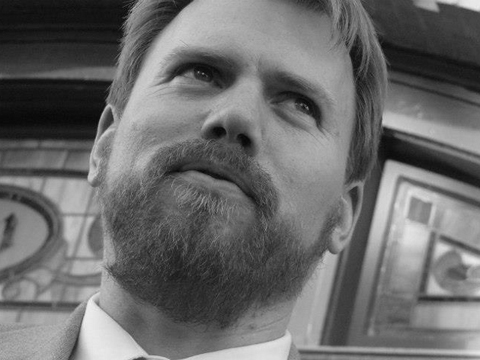
ENGAGED Collins. |
Occupy Providence isn't dead. But it's been pretty quiet since it decamped from Burnside Park in January.
The silence is not terribly surprising. Occupyers, in the main, believe our political and economic systems are fundamentally corrupt and in need of wholesale replacement. Most are uninterested in the sort of traditional political activity that might keep them in the news.
But there has always been a wing of the Occupy movement that has advocated for greater participation in mainstream politics. Abel Collins, an environmentalist now waging an independent campaign for Congress, is a part of that wing.
"I view politics as part of the public space," he says, sitting in a conference room at the Phoenix offices, "and if we're occupying public parks to make a statement, I don't see why we shouldn't occupy politics and make a statement there."
The "State House — it's a public building," he continues. "We have the right to go there and make our voices heard. Politicians — they have a terrible reputation as being totally out of touch and listening only to wealthy people. But part of that is only because the rest of us aren't going there and talking to them enough."
To ignore the realm of politics, Collins says, is to silence one's voice. Engagement is the thing. And his Congressional bid is a test of that principle. But the results, thus far, are mixed.
WPRI-TV's decision to exclude Collins from a debate with Democratic Congressman James Langevin and Republican candidate Michael Riley can be read as a strike against his argument: a sign that our politics has little place for the sort of radical voice Occupy embodies.
Collins, moreover, appears to have little shot at victory. A new WPRI-TV poll gives Langevin 48 percent of the vote, Riley 31 percent, and the independent just 9 percent.
But the candidate's pragmatic streak means he measures success differently. WJAR-TV is including Collins in its debate this week. And he says his environmentalist friends have won greater access to Langevin in recent weeks, as the incumbent has worked to shore up his electoral coalition.
If he can manage to leapfrog Riley on election day, Collins adds, he could establish that a low-cost, alternative politics free from the influence of corporate interests is a possibility.
Topping Riley is a long shot, of course. And if his candidacy becomes a mere footnote, in the end, Occupyers skeptical of the American political system may wind up with another talking point.
But elections, of course, are not the only way to affect public policy. Collins, on leave from his job as program manager for the Rhode Island branch of the Sierra Club, says environmentalists' advocacy has lately helped to stall Rhode Island Public Transit Authority service cuts. And he is hopeful that continued advocacy will deliver the long-term funding the agency needs.
It's not a seat in Congress. But it's something.